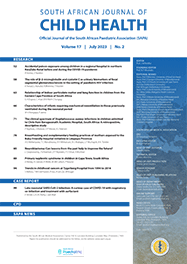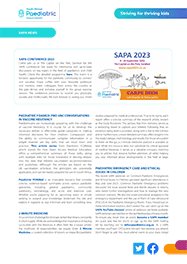Articles

Prevalence of the molecular marker of chloroquine resistance (pfcrt 76) in Nigeria 5 years after withdrawal of the drug as first-line antimalarial: A cross-sectional study
Abstract
Methods. We monitored the resistance pattern 5 years after withdrawal of CQ, using the pfcrt K76T mutation as a molecular marker for CQ resistance.
Results. Of 98 Plasmodium falciparum-positive blood samples, 95 (96.9%) showed the K76T mutation. Twenty-seven (27.6%) of the children had been treated with CQ at home before presentation at the clinic, while 50 (51.0%) had taken other antimalarials.
Conclusion. Our results indicate that there is an urgent need to re-evaluate antimalarial drug policy in Nigeria, especially when 27.6% of our study population still use CQ at home despite its withdrawal as first-line antimalarial. This may require effective legislation against the manufacture, importation and use of CQ in Nigeria, if the purpose behind its withdrawal is to be achieved.
Authors' affiliations
Michael Efunshile,
Tamramat Runsewe-Abiodun, Olabisi Onabanjo University
Beniam Ghebremedhin,
Wolfgang König,
Brigitte König,
Full Text
Keywords
Cite this article
Article History
Date published: 2011-06-29
Article Views
Full text views: 1279

.jpg)



Comments on this article
*Read our policy for posting comments here